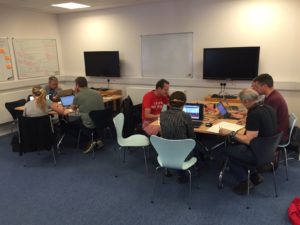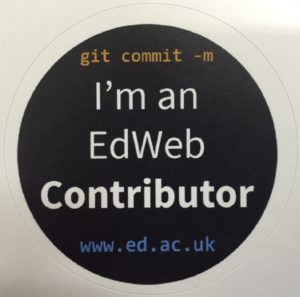Sprinting towards a new goal
The first EdWeb code sprint took place with 14 people coming together to discuss, develop, code and problem solve a set of requirements and changes for EdWeb.
This is a collaboration between two teams within Information Services: Applications and UWP and with developers from all around the University.
Our first EdWeb code sprint
Our first sprint was an opportunity for University developers to come together for a day to work on fixes and enhancements for EdWeb. To write, modify and breathe code basically. They brought their expertise and enthusiasm to work on a list of ‘sprint candidates’ gathered collaboratively from the needs expressed by our publishing community. The aim was to get any completed work in a suitable state to be committed back to the main code repository by the end of the day. No easy feat.
Our previous way of working
The traditional approach we’ve taken to software development is one of using a variety of different project management methodologies and developing and operating within a fairly closed project environment. And of course there is absolutely nothing wrong with this approach and we’ll continue to use this as a tried and tested method going into the future.
However there is a vast pool of talent and experience in the University that we’d like to tap into and who would also like to contribute. By doing this we can expand our pool of developers so that we can complete more work and deliver changes quicker to the University CMS EdWeb. This is also the sort of approach that is flexible enough to allow work to progress towards more localised business solutions but with the added bonus of benefiting the whole publishing community.
Everyone is in agreement that this is the way to go. It’s one of the reasons we choose to move to an Open Source system when we first started the project to build a new CMS over 3 years ago. However it’s a real organisational and cultural change. It’s one thing talking and discussing about opening up systems to community development to actually going ahead and allowing this.
What happened on the day
Our developers Mairi Fraser and Adrian Richardson presented a complete walk through of the process of taking on an issue, investigating the solution, making code changes and preparing to feed this back to the main code base. During this we explored coding environments and local development set ups and discussed the current automated testing approach.
Through some additional discussion work was distributed through the group with most people wanting to take an easy task for their first attempt so as to learn the ropes and build confidence.
It really was a resounding success with 7 out of the 8 tasks that were started being completed. It was a great opportunity to swap tips and tricks, share coding conventions, best practices and to get things done.
The take-away from this code sprint? Why haven’t we done this earlier! And why aren’t more people doing this around the University!
More on the code sprint
Mairi, the project lead developer, has also written a blog about the day.
Code sprint five by five – blog post by Mairi Fraser with detail of the code sprint and a great set of recommendations on what is needed to run a code sprint.
Different ways to get involved with EdWeb
Who can change EdWeb? You! – Stratos introduces the concept of change and how you can be involved in the evolution of EdWeb. Change is an integral and necessary part of the modern philosophy of development and service management, while managing it requires planning, effort and processes. Enter the EdWeb Technical Change Advisory board (CAB).
The EdWeb development road map – As a way of continuing to engage with the web publishing community and all EdWeb stakeholders we’ve been working on creating an easily shareable road map. We want a simple way to share what’s already been developed, what we are currently working on and what could come next.
EdWeb feature prioritisation survey results – Back in May Neil distributed a short survey to all EdWeb CMS users and stakeholders in the management of University websites. In this post, he shares the data collected, and provides a little commentary.
Save




3 replies to “Sprinting towards a new goal”